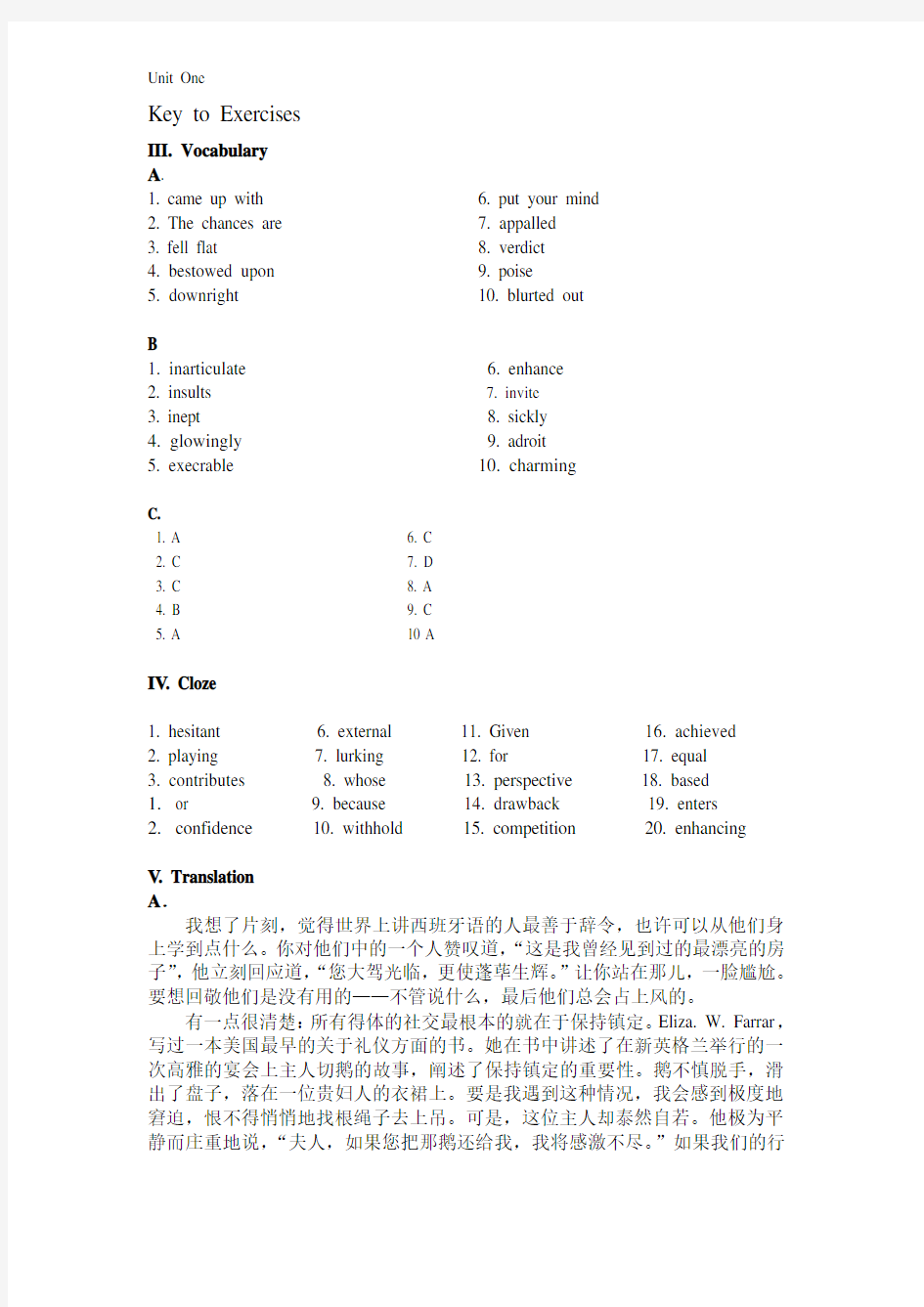研究生综合英语2课后答案与课文翻译.

- 1、下载文档前请自行甄别文档内容的完整性,平台不提供额外的编辑、内容补充、找答案等附加服务。
- 2、"仅部分预览"的文档,不可在线预览部分如存在完整性等问题,可反馈申请退款(可完整预览的文档不适用该条件!)。
- 3、如文档侵犯您的权益,请联系客服反馈,我们会尽快为您处理(人工客服工作时间:9:00-18:30)。
Unit One
Key to Exercises
III. Vocabulary
A.
1. came up with 6. put your mind
2. The chances are 7. appalled
3. fell flat 8. verdict
4. bestowed upon 9. poise
5. downright 10. blurted out
B
1. inarticulate 6. enhance
2. insults 7. invite
3. inept 8. sickly
4. glowingly9. adroit
5. execrable 10. charming
C.
1. A 6. C
2. C 7. D
3. C 8. A
4. B 9. C
5. A 10 A
IV. Cloze
1. hesitant 6. external 11. Given 16. achieved
2. playing 7. lurking 12. for 17. equal
3. contributes 8. whose 13. perspective 18. based
1.or 9. because 14. drawback 19. enters
2.confidence 10. withhold 15. competition 20. enhancing
V. Translation
A.
我想了片刻,觉得世界上讲西班牙语的人最善于辞令,也许可以从他们身上学到点什么。你对他们中的一个人赞叹道,“这是我曾经见到过的最漂亮的房子”,他立刻回应道,“您大驾光临,更使蓬荜生辉。”让你站在那儿,一脸尴尬。要想回敬他们是没有用的——不管说什么,最后他们总会占上风的。
有一点很清楚:所有得体的社交最根本的就在于保持镇定。Eliza. W. Farrar,写过一本美国最早的关于礼仪方面的书。她在书中讲述了在新英格兰举行的一次高雅的宴会上主人切鹅的故事,阐述了保持镇定的重要性。鹅不慎脱手,滑出了盘子,落在一位贵妇人的衣裙上。要是我遇到这种情况,我会感到极度地窘迫,恨不得悄悄地找根绳子去上吊。可是,这位主人却泰然自若。他极为平静而庄重地说,“夫人,如果您把那鹅还给我,我将感激不尽。”如果我们的行
为举止都能保持这种风度,摆脱局促不安,那我们的社交生活就会有趣得多。
如果我们牢记这一点,我们就会显得更加镇定自如:每当有人恭维你时,他可能只是想和你说说话。唯一明智的回答就是由八个小小的字母构成的两个简洁的小词:Thank you !
B.
An important step in becoming an effective flatterer is to understand why flattery helps you establish better relationships with others. The root cause of the power of flattery gets at a basic principle of human behavior: People crave being appreciated., The vast majority of people are of the similar idea despite different cultures. In Asian cultures the desire for group recognition is generally stronger than the desire for individual recognition. Nevertheless, the need for recognition is present.
Many people hold that the joy of work itself is more important than external recognition, including flattery. The joy of work may be a powerful motivator, but even those who get the biggest joy from their work--- such as scientists, artists, and photographers --- crave flattery and recognition. Otherwise they wouldn’t compete for Nobel Prizes or enter their work in important exhibitions.
Another reason flattery is so effective relates to the normal need to be recognized. Although some articles and books have been written and preached zealously about flattery, most people receive less recognition than they deserve. Many people hardly ever receive compliments either on the job or at home, thus intensifying their demand for flattery.
Translation of Text
如何应对恭维
H·艾伦·史密斯
尽管我确信蓄胡子会使我更加气度不凡,走在大街上会使女性发笑,但我从不留胡子,原因是我不敢冒险,因为哪怕蓄一点点胡子也很危险,它会招来别人的恭维。例如,如果一位女士走到我跟前,说道:“你的胡子最迷人,”我会无所适从,不知怎样回答才好。我可能会惊慌得脱口而出:“我也喜欢您的胡子。”
在社会交往中,应对恭维比对付辱骂要艰难得多,这话听起来有点矛盾,却有一定的道理。闲聊时来句恭维话,往往让我们大多数人不知所措。例如,有人对我们说上一句动听、赞美的话,我们就慌得说不出话来,膝盖开始瑟瑟发抖。
如果别人称赞不是真正属于我自己的东西时,我根本无法欣然接受。我家住在一个小山上,俯瞰山下一片宽广的谷地。来访者惊叹道:“天哪!你这儿的景色太美了!”整个山谷原本就在那里,不是我造的,也不属于我。然而我傻乎乎地笑着说:“噢,没什么——无非是过去留下的一片土地而已。”
我在接受这种特定的恭维时,表示最能完全接受的说法就是“嗯,我们喜欢。”采用这种答话必须得小心谨慎。就某样东西说“我们喜欢”,言外之意就是,还有许多其他人都认为它很令人讨厌。不久前,我和一批人在一起时,其中有位来自澳大利亚的地球物理学家在滔滔不绝地谈论宇宙中的奇观。“我们生
